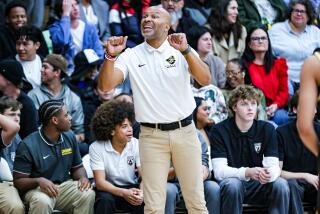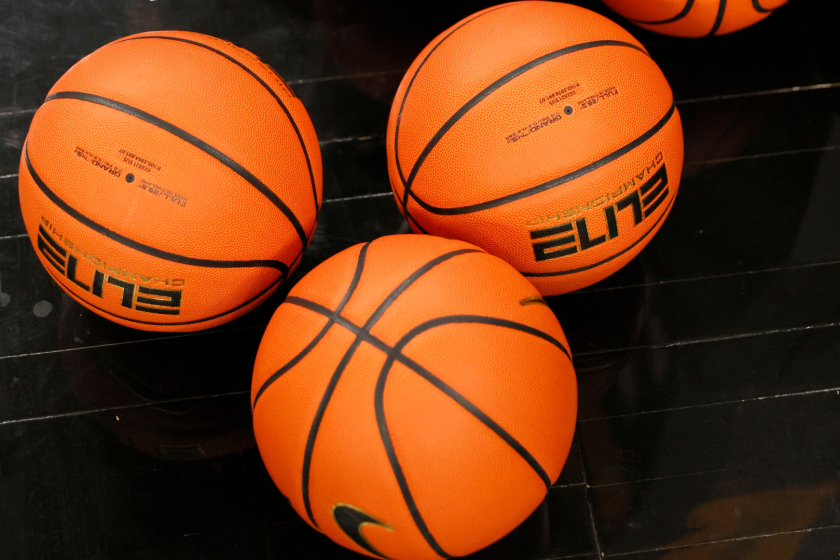PERSPECTIVE ON COLLEGE SPORTS : Education Involves More Than Intellect : Scandals and elitism feed the prejudice that competitive athletics are an unworthy pursuit in ‘higher’ education.
- Share via
Never think of yourself as being above sports.
--Arthur Ashe
With a long college football weekend at hand, we would do well to remember these wise words written by Arthur Ashe in the last days of his life to his young daughter, Camera.
His words, penned just 15 days before his death, are particularly poignant to this professor and college sports fan. They are part of an eloquent attempt by an athletically gifted sage to breathe new life into a woefully tired cliche: “Sports build character.”
Ashe’s sentiments are soberingly apropos, especially in light of the news early this season of yet three more prestigious educational institutions--Auburn and Texas A&M; universities and the University of Washington--being pilloried for football programs that ran out of bounds.
Unfortunately, these eye-blackening blemishes mar the face of what is otherwise a truly marvelous learning experience--specifically, an education of character--from which thousands of young men and women benefit.
Big-time college athletics, like many other high-stakes societal practices, certainly has its share of ethical wanderings. Some athletic programs seem to lack any kind of moral compass; a few are morally bankrupt.
We should remember, however, thatthere are many thousands of student athletes and coaches who are not involved in the ethical morass of big-money, big-time college athletics. Further, despite assumptions to the contrary, there still exist prestigious institutions with big-time athletic programs whose successes have been paved by the road of academic integrity.
Nonetheless, the much-publicized scandals of big-time college sports continue to feed a pervasive prejudice that sees intercollegiate athletics as educationally unimportant. Many university insiders and outsiders continue to believe that competitive athletics are strangely out of place in the “higher” world of theses, thesauruses and, well, thought.
Despite screaming newspaper headlines and electronic news-bites, intercollegiate athletics continue to be educational in the higher senses of the term. Not, of course, in the traditional sense of scholarship but in the sense of overall personal development.
If the “higher” of higher education involves the transmission of traditional values--such as loyalty, trust, teamwork, integrity, commitment and responsibility--that sustain society, then athletics is indeed a powerfully “high” teaching resource. Many colleges and universities, such as my own, remain committed to an education of the whole person, not merely the intellect.
We cannot underestimate the degree to which athletic competition teaches student-athletes about their innermost selves, emotions and character. As Ashe emphasized, “The lessons of sports are not duplicated easily.”
Describe it however you like: Sports build character or sports test character or, as former UCLA coach extraordinaire John Wooden once said, sports expose character. Sports may at times even sully character. However it is expressed, intercollegiate sports teach invaluable lessons--”higher” lessons--about life and self to thousands of university men and women.
An emerging field of research known as “multiple intelligences” is helping to debunk the view of athletics as “lower” education. In his book “Seven Kinds of Smart,” Thomas Armstrong of the University of California underlines why so many people make the mistake of relegating athletics to the lowest rung on the educational ladder.
“Physical activity (has been) assigned a lower-class status and restricted to . . . the playing field,” he writes. “Athletes are all too often seen as ‘dumb jocks,’ and working with the hands in manual arts is assigned a second-class status in comparison to the ‘higher’ world of the humanities and sciences.”
It is true that universities continue to be places where standards of excellence are identified, applied and debated in the humanities and sciences. But our understanding of “higher” should also include intercollegiate athletics, which, in the words of sports philosopher Robert Simon, “provide a clear institutional framework where the value of standards of excellence in meeting challenges is demonstrated and reinforced.”
Sounds like something Arthur Ashe would have said.
More to Read
Go beyond the scoreboard
Get the latest on L.A.'s teams in the daily Sports Report newsletter.
You may occasionally receive promotional content from the Los Angeles Times.










